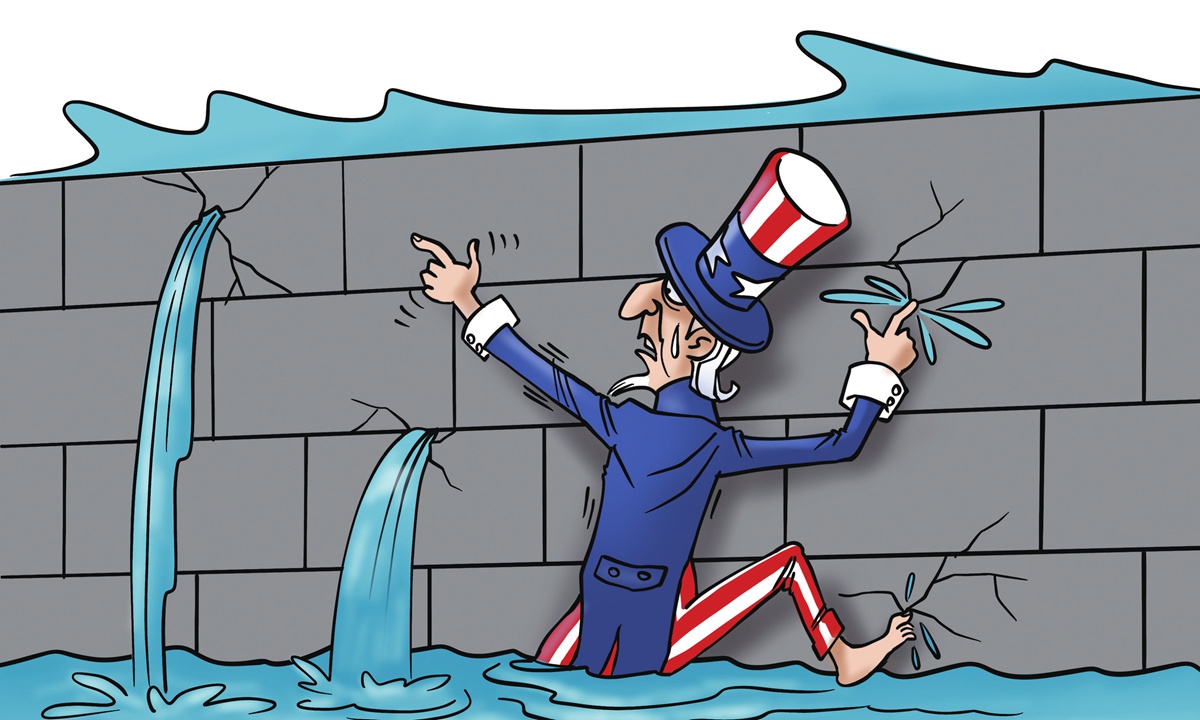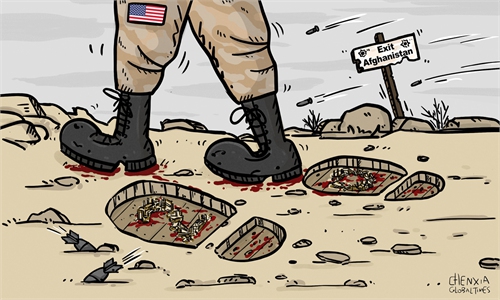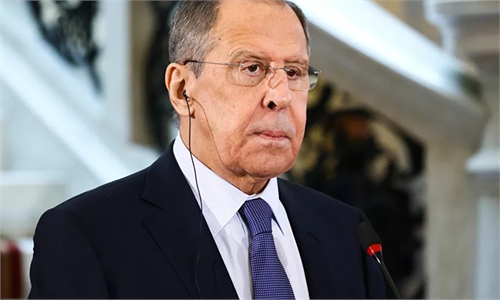
Illustration: Liu Rui/GT
US troop withdrawal from Afghanistan is scheduled to be completed on August 31. When US President Joe Biden defended his decision to put a final end to the two-decade-old US military mission there earlier this month, he delivered three main messages.
First, the withdrawal is a "responsible" move. Second, the US needs to reflect on the war since it has paid a heavy price for it. Third, the US is adjusting its strategic needs and will "focus on shoring up America's core strengths to meet the strategic competition with China and other nations," as Biden said on July 8.
US military has been stationed in Afghanistan for 20 years. Yet till today, Afghanistan is entangled in chaos. The "bright future" for Afghanistan that the US government has once promised never came true.
From the Obama administration, Washington has been adopting a strategic contraction posture in Afghanistan. The simple reason is that Washington believes that its strategic investments and returns in Afghanistan are disproportionate. Afghanistan remains in disarray. But the US can no longer withstand its losses there. It is clear that the unconventional warfare in Afghanistan has consumed massive strategic resources from the US. Against the backdrop of a relatively tight US defense budget, the significance of Afghanistan in US' global strategy has plunged.
A full pullback of American troops from Afghanistan means that the US strategic deployment will be adjusted. Biden stated that the US is "repositioning" its resources and adapting its counterterrorism posture to meet the threats where they are now significantly higher, in South Asia, the Middle East, and Africa. In other words, Biden believes US engagement in Afghanistan is consuming too much US resources. His troop withdrawal decision has an untold motive - to consolidate US' resources in order to compete with China. This is in line with the country's strategic thinking that the major power competition outpaces anything else, which Biden's administration inherited from Trump's team.
Taking a look at Biden's China policy since he assumed office, his administration's intention to continue pilling pressure on China is known to all. On the one hand, it is constantly adjusting Washington's strategic moves by concentrating more strategic resources around China. On the other, Washington has been actively teaming up with other countries in order to alienate China. The withdrawal of troops from Afghanistan reflects the true intention of the US government to adjust its strategic deployment. In fact, both Obama and Trump administrations also announced the withdrawal of troops from Afghanistan, but the Biden administration was undoubtedly more anxious and was pushing harder.
However, if the White House wishes to use the resources taken out from Afghanistan to deal with China, it has miscalculated.
The US did invest substantial quantities of resources in Afghanistan over the past 20 years, but its input has dropped in recent years, to only tens of billions of dollars a year. Washington's current investment in Afghanistan is substantially lower than previous years since 2001 when the terror attack on the US happened. If the US wants to use the amount of resources in Afghanistan to deal with China, that would only be a drop in the bucket.
The withdrawal also signals that some politicians in Washington want to confront China from a military angle. This means the risk of a military conflict between China and the US will increase. China is not Afghanistan. The two countries are hugely different in population structure, economic strength and defense capability.
The Biden administration associates the withdrawal of its troops from Afghanistan with the strategic competition with China. This is merely finding an excuse for its full withdrawal - one that allows for the US to conveniently hype up the "China threat" theory again.
The Biden administration believes that China is the strongest competitor shadowing the US now and must go all out to contain and confront China. However, there are some wise people in the US who are worried about this, who believe that China is hugely different from its previous competitors. A military confrontation with China is just too dangerous for the US.
US withdrawal from Afghanistan is a manifestation of the US strategic contraction. The Biden administration, which has been clamoring to protect "human rights", does not care about whether the withdrawal will cause a humanitarian disaster in Afghanistan. Associating the withdrawal with China is nothing but a tactic of the Biden administration, to put more US efforts to portray China as the primary threat to the US, so it can carry out relevant strategic mobilizations. The move's symbolic value is greater than its practical significance.
The author is director of the International Security Study Center at China Foreign Affairs University in Beijing. opinion@globaltimes.com.cn


